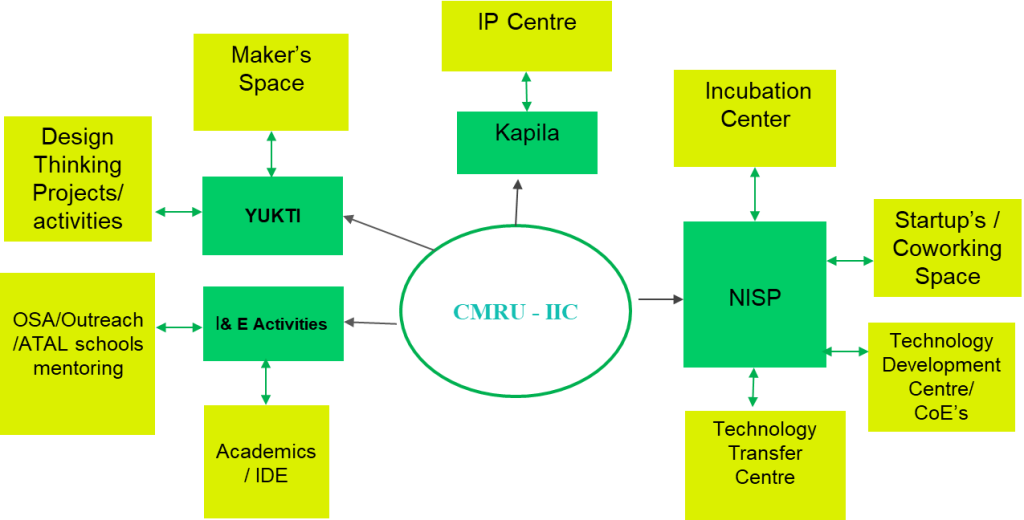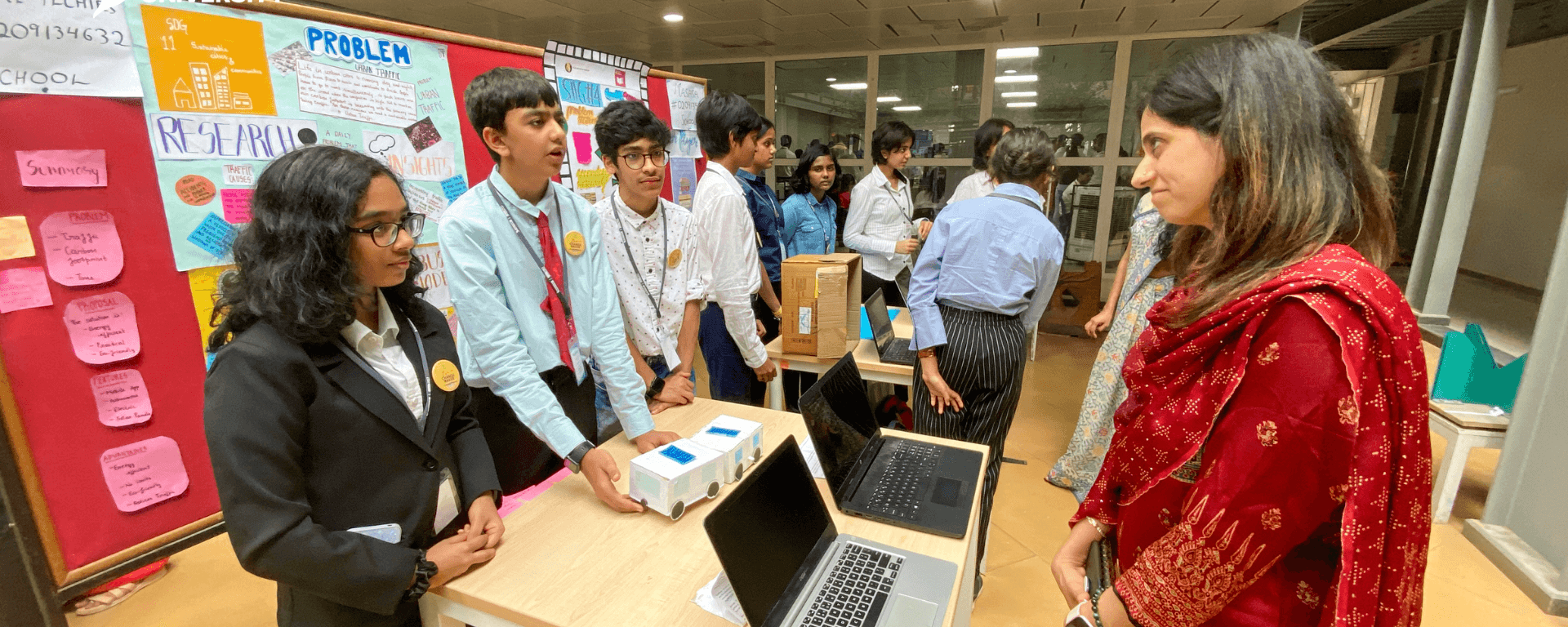Innovation is the cornerstone of progress in today’s rapidly evolving world. At the heart of effective innovation lies design thinking — a human-centred, solution-focused approach that nurtures creativity and problem-solving abilities.
CMRU has embraced design thinking as a foundational methodology for fostering innovation and entrepreneurship among its students. Through its strategic alignment with the Ministry of Education’s Innovation Cell, CMRU has built a robust and self-sustained innovation ecosystem that empowers students to transform ideas into impactful solutions, contributing significantly to India’s Atmanirbhar Bharat mission.
The Importance of Design Thinking in Nurturing Innovation
Design thinking is more than a methodology; it is a mindset that combines logic, imagination, intuition, and systemic reasoning to explore possibilities and create desired outcomes that benefit users. Unlike traditional problem-focused approaches, design thinking is solution-oriented and action-driven, encouraging iterative prototyping and continuous refinement to meet real needs effectively.
“Design thinking speaks about a problem-solving approach,” said Dr Kiran Kumari Patil, President-Institute Innovation Council, CMRU and Deputy Director, School of Engineering and Technology (SOET). “We want to create problem solvers and creative thinkers through our design thinking course. Since we begin this training from the first semester, our students are quickly becoming innovators. The idea is to solve social problems,” she said.
The approach fosters entrepreneurial thinking by enabling students to empathise with people and their daily problems, define these problems clearly, ideate creatively, prototype rapidly, and test thoroughly.
By integrating design thinking into its innovation framework, CMRU equips students with the tools to tackle complex challenges creatively and collaboratively, preparing them to become future-ready innovators and entrepreneurs.
Collaboration With The Ministry of Education’s Innovation Cell
The Institution’s Innovation Council (IIC) was launched in 2018 by the Ministry of Education through its Innovation Cell in collaboration with the AICTE. The Ministry’s goal is to foster a structured innovation and startup ecosystem within Higher Educational Institutions across India.
The IIC at CMRU conducts innovation and entrepreneurship activities, organises hackathons and idea competitions, facilitates mentorship from industry experts and promotes intellectual property rights awareness among students and faculty.
By partnering with the Ministry’s Innovation Cell, CMRU ensures students gain access to national-level resources, government-led initiatives, and a vibrant network of innovators, which significantly enhances their capacity to foster creativity and entrepreneurship.
CMRU’s Unique Innovation Ecosystem: The I-6 Framework
CMRU’s innovation journey is distinguished by a unique, integrated framework designed by Dr Kiran Kumari Patil, Deputy Director of the School of Engineering Technology and President of CMRU’s IIC.

Known as the I-6 framework, it encompasses six strategic pillars that include incubation centres, design thinking projects, startup coworking spaces, outreach programs like mentoring Atal Tinkering Labs schools, technology transfer centres and capacity building among faculty and students.
This holistic approach ensures that innovation is embedded in the academic culture, providing continuous support from ideation to prototype development and eventual commercialisation. The framework also emphasises social impact by encouraging students to solve real-world problems at the grassroots level, thereby contributing to community development and the nation’s economy.
“As per the National Education Policy (NEP 2020), our focus on innovation as a tool to reform education is being adopted and practiced to develop critical thinking and equip students with 21st century skills. These skills are now more paramount than ever before to ensure that students can thrive in a fast-changing world. We want our students to enter the world with an understanding of critical thinking, effective communication, collaboration, creativity, imagination, and adaptability, among others,” stated Dr Kiran Kumari Patil, President-Institute Innovation Council, CMRU and Deputy Director, School of Engineering and Technology (SOET).
“The Ministry’s Innovation Cell’s mission is to create innovators across India. This is one of the unique features of CMRU wherein we are mapping design courses and resources with the IIC. This strengthens the entrepreneurship and innovation ecosystem in CMRU,” said Dr Patil.
CMRU’s Aspiration: Creating Unicorn Startups and Supporting Atmanirbhar Bharat
CMRU aspires to be a cradle for unicorn startups that can drive India’s economic growth and technological self-reliance. CMRU has aligned itself with the Prime Minister’s Atmanirbhar Bharat mission.
The university’s innovation ecosystem encourages students to develop scalable solutions that address local and national challenges, thus building a strong community of innovators who contribute to sustainable development and economic prosperity.
CMRU’s IIC actively organises a variety of activities to stimulate innovation and entrepreneurship among students. The student Innovation Ambassadors of IIC is an active body with dynamic students’ leaders driving innovation cross campus and communities around.
Ideation Sessions: Facilitating brainstorming workshops where students generate and refine innovative ideas.
Hackathons and Innovation Challenges: Competitive events that encourage rapid problem-solving and prototype development.
Workshops on Design Thinking: Training sessions that impart design thinking methodologies to students and faculty.
Mentorship Programs: Access to a pool of mentors including entrepreneurs, investors, and industry professionals who guide students in their innovation journey.
Prototype Development: Support for building proof-of-concept models and refining ideas for market readiness.
These activities provide a hands-on learning environment where students can experiment, fail, learn from their errors and iterate – essential for entrepreneurial success.
The framework provides students with invaluable practical experience beyond traditional classroom learning. They develop critical entrepreneurial skills such as opportunity recognition, customer empathy, business model creation, and intellectual property management. This experiential learning prepares them to launch startups and create solutions that have real-world impact.
Several innovative projects and startups have emerged from CMRU’s ecosystem, exemplifying the effectiveness of this approach. Notable student innovations include:
RFID Logger with Google Sheets Integration: An IoT system that streamlines data logging.
Autonomous Intra-campus Delivery Rover: A robotics project using optical computer vision for campus logistics.
Momentous: A startup incubated at CMRU’s Maker’s Space.
Piezoelectric Mat for Gamifying Bharatanatyam Teaching: An innovative educational tool combining technology and traditional art forms.
With continued focus on design thinking, mentorship, and hands-on activities, CMRU is poised to nurture the next generation of changemakers who will drive India’s innovation landscape forward.
